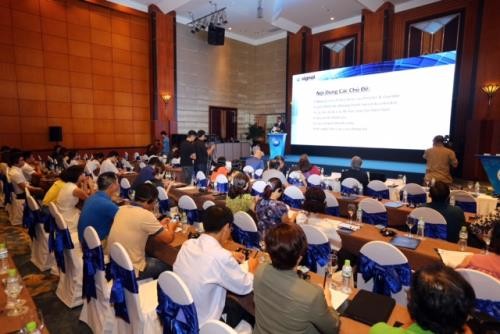(VOVWORLD) - Small and medium-sized enterprises play a crucial role in Vietnam’s economic growth. The ongoing 2017 APEC Small and Medium Enterprises Ministering Meeting in Ho Chi Minh City creates an opportunity for Vietnamese SMEs to share experience with their partners in the region and for the Vietnamese government to fine-tine SME support policies.
 Discussion on improving SMEs' competitiveness (Photo: TTXVN) Discussion on improving SMEs' competitiveness (Photo: TTXVN)
|
Small and medium-sized enterprises comprise 98% of Vietnam’s total enterprises, contribute 40% of the GDP and 30% of the state budget, and generate half of all jobs. But SMEs have difficulties modernizing their equipment and facilities, finding new markets, and distributing their products.
Vietnamese SMEs seek new ways amidst globalization
At the 2017 APEC Small and Medium Enterprises’ Meeting, managers, economies and speakers from APEC member economies urged SMEs to work out a strategic direction for their development path. Tran Van Phat is the CEO of the Robot Company: “Vietnamese enterprises need to participate more in economic forums. We need to prepare for the intrusion of foreign economies and expand economic relations to seize opportunities to enhance our growth.”
Many countries including Vietnam are urging their SMEs to participate in global logistics supply chains because this sector is of great importance to international trade. Tran Chi Dung, Director of the Logistics Knowledge Company, says the logistics industry creates learning opportunities for Vietnamese SMEs who are participating in global value chains. Vietnam has launched a National Action Program on Logistics Development to help improve the competitiveness and growth of enterprises and the economy. Mr. Dung said: “We need to help enterprises understand and approach the program. The State needs to adopt new policies and allocate budgets to carry out promotion activities to attract enterprises.”
The Vietnamese government creates optimal conditions for SMEs
The Law on Supporting Small and Medium Enterprises which will take effect next year realizes Vietnam’s policies on promoting the private sector and creating momentum for small and medium enterprises. At a recent conference on SME development, Prime Minister Nguyen Xuan Phuc pointed out the barriers to enterprise development: “There remain many obstacles to Vietnamese penetrating the market. Regulations for enterprises in high-tech, science, technology, and support industries have not been fully enforced. The government welcomes your contributions to developing mechanisms and policies to ensure fairness for both public and private sectors in line with international norms.”
The Prime Minister also mentioned the difficulties SMEs have in accessing credit, information, and market support and promised to create a fair, friendly environment to promote investment and ensure regulation enforcement. He said the government will seek solutions to reduce costs for enterprises: “The government will review regulations and take steps to reduce costs in tax procedures, customs, BOT, logistics, and public services. These costs are burdens on enterprises.”
In the near future, the Vietnamese government intends to improve the competitiveness of Vietnamese SMEs by optimizing advances of the 4th industrial revolution, strengthening the digital infrastructure, and developing high-end human resources.